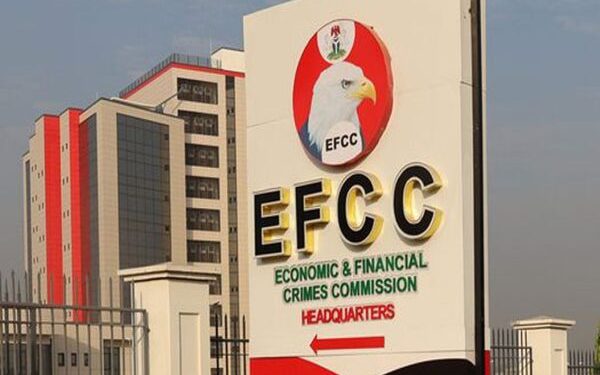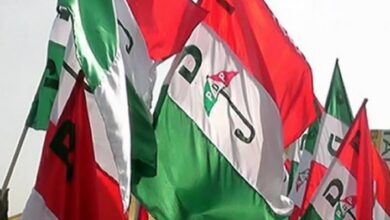
On July 29, 2019, Mr Kola Ologbondiyan, then National Publicity Secretary of the Peoples Democratic Party (PDP), raised concerns about the ministerial nominees just one month after President Muhammadu Buhari began his second term in office.
The PDP expressed worries about the backgrounds of some nominees and requested that the Senate extend its screening process to include investigations by the Economic and Financial Crimes Commission (EFCC) and the Department of State Services (DSS).
Although this plea was not heeded, several ministers from Buhari’s administration are currently facing charges brought by the EFCC.
A notable example is Hadi Sirika, the former Minister of Aviation, who is currently on trial for a N5.8 billion fraud case initiated by the EFCC.
Another instance involves Godwin Emefiele, the former Governor of the Central Bank of Nigeria, whose controversial economic policies have not only harmed the economy but also reflected his corrupt practices.
Numerous former ministers and governors who gained public office under questionable circumstances are now navigating the EFCC’s processes in pursuit of redemption.
Even the case of Kemi Adeosun, the former Minister of Finance, highlighted issues of integrity; her resignation followed an investigation into a fake National Youth Service Corps (NYSC) certificate.
Additionally, Babachir Lawal, the former Secretary to the Government of the Federation, faced prosecution after spending N500 million on grass-cutting services, leading to his removal from office.
The trend of ministerial nominees facing integrity issues raises concerns about the relevance of outright Senate approval for these positions, especially considering the number of ministers who have failed the integrity test while in office.
Shortly after her appointment, Beta Edu, Tinubu’s former Minister of Humanitarian Affairs and Poverty Alleviation, delivered a testimony at Faith Tabernacle in Ota about her prayers for ministerial success.
However, it was soon revealed that she was embroiled in financial misappropriation, with the EFCC recovering over $24 million from her.
Despite her church affiliations, she found herself disqualified from “heaven” by the very agency intended to protect the public.
The biblical saying that “the kingdom of heaven suffers violence, and the violent take it by force” resonates here.
The Book of Luke 18:25 indicates that it is easier for a camel to pass through the eye of a needle than for a wealthy individual to enter the kingdom of heaven.
Under the leadership of Mr. Ola Olukoyede, the EFCC serves as a gate for those burdened by corruption.
It would be prudent for President Tinubu’s six newly appointed ministers to undergo EFCC scrutiny before their Senate appearances.
Also Read: N950m Fraud: Court Declares Former Punch Employee Olusegun Ogunbanjo Wanted
The Senate should rely on the EFCC and other anti-graft agencies to conduct thorough background checks on nominees for ministerial and other public offices.
Just as the DSS evaluated the nomination of former Governor Nasir El-Rufai for ministerial appointment, the EFCC should also be an essential gatekeeper against corruption.
Satguru Maharaj Ji, the founder of the One Love sect, controversially suggested that ministerial nominees be screened by both the EFCC and the Independent Corrupt Practices and Other Related Offences Commission (ICPC).
He argued that such scrutiny would help verify the integrity of nominated public officials. Maharaj Ji, though celestial in outlook, emphasizes the importance of earthly integrity, as it lays the foundation for qualifying individuals for heavenly expectations.
The pressing question remains: how many public servants can stand before the EFCC gate untainted? He has called on the president to take proactive measures in recovering the nation’s economy and addressing corruption, emphasizing that the fight against corruption should start with the calibre of individuals selected for governance.
Recall that former Kaduna State Governor Nasir El-Rufai faced EFCC scrutiny, yet he was nominated for a ministerial appointment.
However, the Senate denied approval, citing a multitude of petitions against him. Even though he swiftly attempted to address concerns, the integrity of our leadership remains paramount.







